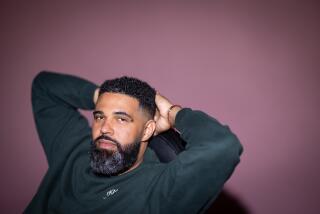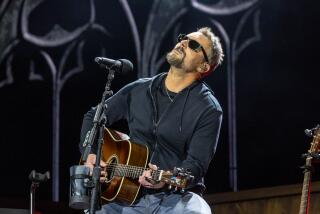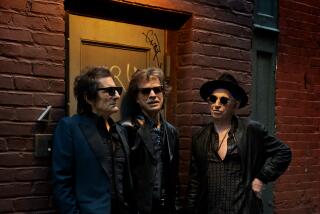POP MUSIC REVIEW : Jr. Walker Takes Show From a Jog to an All-Out Run : After a muzzled start, the saxophonist and his All Stars jam on the 1966 hit ‘Road Runner’ and keep up the red-hot pace for the rest of the evening.
- Share via
SAN JUAN CAPISTRANO — Jr. Walker is so closely identified with his nearly 30-year-old hit “Shotgun” that the tune’s title has become part of his name. Thursday at the Coach House his guitarist, Harvey Williams, repeatedly introduced his boss as Jr. (Shotgun) Walker.
But Walker seemed to favor another name, “Road Runner,” when he talked about himself between numbers, and the designation somehow seemed more apt. It wasn’t until he struck up that 1966 hit well into his 90-minute set that things took off.
Before that, problems with feedback and an apparent lack of enthusiasm kept the man and the music muzzled. Luckily, “Road Runner” got the saxophonist firing on all cylinders. And by the time he loaded up for “Shotgun,” Walker, and the audience, were having a blast.
Before Walker came out, singer Robert Stone warmed up the All Stars--guitarist Williams, organist Delby Littlejohn, bassist Michael Wakes and drummer Jerome Teasley--with roadhouse-styled versions of “Got My Mojo Working” and “Sweet 16” sung in a strong voice and decorated with the expected risque asides and gestures. Williams’ up-neck guitar solo on “16” hinted at good things to come.
But with Walker on stage and the squealing distraction of feedback, the band seemed hesitant to cut loose. Walker tried to get it started on “What Does It Take (to Win Your Love)” by picking up the tempo and issuing squeals of his own from the tenor. But the All Stars didn’t take the bait.
Then he answered a call from the audience for one of his funkiest numbers, “Homecookin’,” by saying, “Now that’s goin’ back in the files” and explaining that his current band was too young to know it. Instead he jumped into “How Sweet It Is (to Be Loved by You),” but the good-time number, complete with call and response from the audience, fell flat.
But everything fell together during “Road Runner.” Suddenly, Walker’s cries, shouts and stuttering rhythmic lines dropped into place behind tough bass lines from Wakes. Drummer Teasley, playing a surreal-looking drum set that appeared to have melted askew under a hot sun, drove the rift with snapping snare hits and tom-tom rolls. And organist Littlejohn got the Hammond to whine.
Still, the main attraction was Walker, pushing into his solos from up top before breaking into a series of guttural clucks and chicken scratch. His play has changed little since charting 20 some tunes in the ‘60s and early ‘70s, and his trademark calls and caterwauls serve as a touchstone to those times. But his sound is hardly dated, and younger R&B; sax aspirants, such as Everette Harp and the vastly popular Dave Koz, would do well to give the man a serious listen.
Walker continued to fire up even the more conservative numbers, including “These Eyes” and “Pucker Up, Buttercup,” with bouncy play and gruff, spirited vocals. The funk of “Hip City,” with Walker’s calls to “get on the hip side of town,” brought out a percussively delivered rap. When he finally moved into “Shotgun,” his voice, like his tenor play, was rough, tough and assertive.
Blues guitarist John Heussenstamm’s trio preceded Walker with a sharp, electric program that covered Albert King, James Brown and Jimi Hendrix. Heussenstamm showed he has licks galore but seldom delivered anything to sink teeth into. His solo on King’s “Born Under a Bad Sign” was appropriately dark and foreboding while avoiding reliance on King’s trademark lines. Bassist Armando Compean upstaged Heussenstamm in the vocal department, but, as an instrumental unit, the band was tightly knit.
More to Read
The biggest entertainment stories
Get our big stories about Hollywood, film, television, music, arts, culture and more right in your inbox as soon as they publish.
You may occasionally receive promotional content from the Los Angeles Times.










